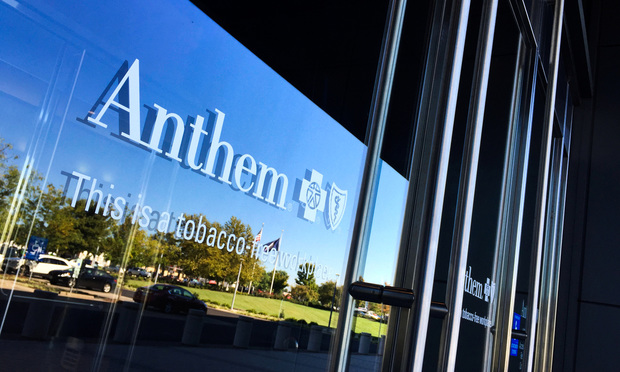 Anthem office in Richmond, Virginia. Photo by Diego M. Radzinschi/THE NATIONAL LAW JOURNAL
Anthem office in Richmond, Virginia. Photo by Diego M. Radzinschi/THE NATIONAL LAW JOURNAL
Eleven states and the District of Columbia will receive nearly $3 million in legal fees as part of an agreement following antitrust litigation that successfully blocked the proposed $54 billion merger of Anthem Inc. and Cigna Corp.
California, Connecticut, New York, Georgia and the District of Columbia were among the states that challenged the proposed tie-up in Washington federal district court. The settlement agreement says the $2.975 million payment for fees and costs will be paid to the state of Maryland, which “will be responsible for disbursing the funds to the other plaintiff states as they may agree among themselves.”
Related: Cigna, wave of health care deals to spark antitrust scrutiny
Messages left with Maryland Attorney General Brian Frosh's office were not immediately returned Friday.
Lawyers for the plaintiff states filed a proposed order in Washington federal district court on Thursday announcing the fee settlement. The amount of the fees did not appear in the proposed order “at the request of Anthem and Cigna,” lawyers for the plaintiff states said in the court filing.
Charles Rule at Paul, Weiss, Rifkind, Wharton & Garrison, a lawyer for Cigna, was not immediately reached for comment. Anthem's lead trial attorney, Christopher Curran of White & Case, also was not immediately reached.
Thomas Zielinski, the general counsel to Indianapolis-based Anthem, signed the settlement with Nicole Jones, general counsel to Bloomfield, Connecticut-based Cigna. The companies agreed to split the payment equally.
The state plaintiffs in conjunction with the U.S. Department of Justice sued in July 2016 in Washington federal district court to block the deal. The proposed merger would have created the largest health insurance company in the country. The plaintiffs argued at trial that competition creates innovation.
U.S. District Judge Amy Berman Jackson of the District of Columbia blocked the merger in February 2017. The insurance giants quickly appealed the ruling to the U.S. Court of Appeals for the District of Columbia Circuit and then petitioned the U.S. Supreme Court. When the high court denied the petition in June 2017, Aetna and Cigna abandoned their merger plans.
George Jepsen, the Connecticut attorney general, said in 2016 that his office had spent a year working with law enforcement counterparts to review the proposed merger. Rachel Davis, an assistant attorney general, was a lead trial lawyer for Connecticut in the case.
That work, Jepsen said, included “conducting numerous stakeholder interviews, joining in multiple depositions of party representatives, reviewing thousands of documents and participating in meetings with both parties.” Jepsen said in a statement then: “This merger would substantially lessen competition for the provision of health care insurance services.”
Then-California Attorney General Kamala Harris said in a statement at the time the lawsuit was filed: “We must not allow insurance companies to grow their profits at the expense of consumers. By joining this lawsuit, I urge the court to block this proposed merger.”
A message to California Deputy Attorney General Paula Gibson, a signatory on the agreement with other lawyers for the state plaintiffs, was also not returned.
Mike Scarcella contributed reporting from Washington.
© 2025 ALM Global, LLC, All Rights Reserved. Request academic re-use from www.copyright.com. All other uses, submit a request to [email protected]. For more information visit Asset & Logo Licensing.







